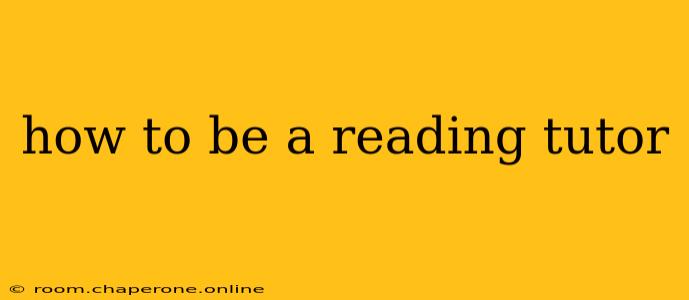Becoming a reading tutor is a rewarding experience, allowing you to make a significant difference in a child's life while honing your own teaching skills. This comprehensive guide will equip you with the knowledge and strategies to excel in this fulfilling career path. Whether you're a seasoned educator or just starting out, this guide will provide valuable insights into building a successful reading tutoring practice.
Essential Skills and Qualities of a Great Reading Tutor
Before diving into the practical steps, let's identify the core competencies that make a reading tutor truly effective:
- Patience and Empathy: Working with children who struggle with reading requires immense patience and understanding. Empathy allows you to connect with students on a personal level and tailor your approach to their individual needs.
- Strong Communication Skills: Clear and concise communication is crucial for explaining concepts, providing feedback, and building a positive rapport with your students and their parents.
- Knowledge of Reading Development: A solid understanding of phonics, phonemic awareness, fluency, vocabulary, and comprehension strategies is essential. You need to diagnose reading difficulties and address them effectively.
- Adaptability and Creativity: Each student is unique, requiring a customized approach. A great tutor adapts their teaching methods and materials to suit individual learning styles and preferences.
- Organization and Time Management: Maintaining records, planning sessions, and scheduling effectively are vital for managing a successful tutoring business.
- Passion for Reading: Your enthusiasm for reading will be contagious and inspire your students to develop a love for books.
Steps to Becoming a Reading Tutor
Follow these steps to transform your passion for reading and teaching into a successful tutoring career:
1. Gain Relevant Knowledge and Skills
- Formal Education: A bachelor's degree in education or a related field is beneficial, but not always mandatory. Many successful tutors have backgrounds in other fields but possess a strong understanding of reading development principles.
- Professional Development: Consider taking courses or workshops focusing on reading intervention strategies, such as Orton-Gillingham or Wilson Reading System. These programs offer structured approaches to teaching reading.
- Self-Study: Numerous resources are available online and in libraries to deepen your understanding of reading acquisition and effective tutoring techniques.
2. Develop Your Tutoring Methodology
- Assessment: Learn to effectively assess a student's reading level and identify their specific areas of weakness. This could involve using standardized tests, informal reading inventories, or observation during reading sessions.
- Lesson Planning: Create engaging and structured lesson plans that cater to diverse learning styles. Incorporate games, activities, and a variety of reading materials to keep students motivated.
- Differentiation: Tailor your instruction to meet the unique needs of each student. This may involve adjusting the pace, complexity of materials, or teaching strategies.
3. Build Your Client Base
- Networking: Connect with schools, libraries, community centers, and other organizations that may refer students to you.
- Online Presence: Create a professional website or social media profile to showcase your services and credentials.
- Word-of-Mouth Marketing: Encourage satisfied clients to recommend your services to others.
- Tutoring Platforms: Consider joining online tutoring platforms to reach a wider audience.
4. Set Your Rates and Business Structure
- Research Market Rates: Determine competitive rates based on your experience, qualifications, and location.
- Legal Considerations: Familiarize yourself with any legal requirements for operating a tutoring business in your area, including taxes and insurance.
5. Maintain Professionalism and Continuous Improvement
- Record Keeping: Maintain accurate records of student progress, sessions, and payments.
- Professional Development: Continue to learn and refine your skills through ongoing professional development opportunities.
- Feedback: Regularly solicit feedback from students and parents to identify areas for improvement.
Conclusion
Becoming a successful reading tutor requires dedication, passion, and continuous learning. By following these steps and cultivating the essential skills and qualities, you can build a rewarding career that helps children develop a lifelong love of reading and achieve their academic potential. Remember, your impact extends far beyond improving reading scores—you’re nurturing a child's confidence and empowering them for future success.

